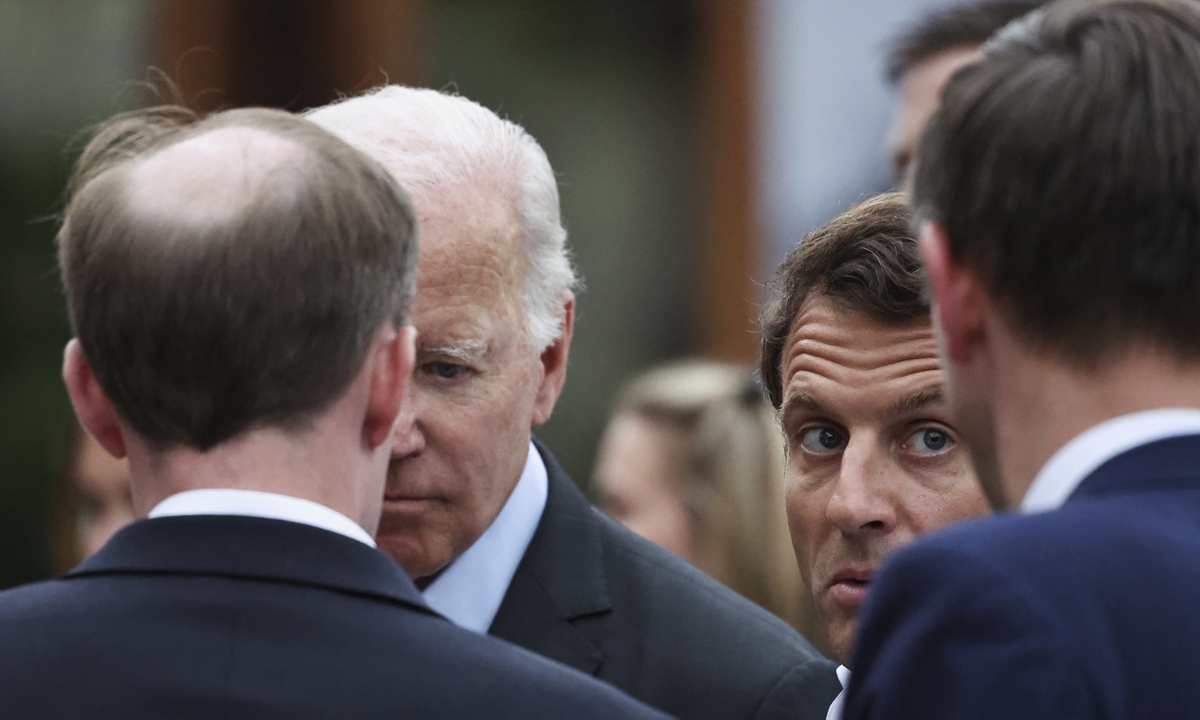
US President Joe Biden (left) and French President Emmanuel Macron attend the G7 Summit on June 27, 2022 at Elmau Castle, southern Germany.Photo: AFP
A corner of US' "toughest playbook on how to tackle China" was unveiled. During the G7 summit on Sunday, US President Joe Biden said: "Collectively, we aim to mobilize nearly $600 billion from the G7 by 2027." He did not name China but US and Western media made no attempt to disguise that it is to "confront" or "compete" with China-proposed Belt and Road Initiative (BRI).
The first impression this ambitious plan has left on people is that the US dangled a carrot in front of the world again. The US "claimed" to contribute $200 billion out of the $600 billion goal and the rest will be shared by the other six countries. Not mentioning the other countries, it is simply impossible for the US to take out $200 billion. This is not looking down upon the US. US' own behavior has left such a deep impression on the outside world.
At the G7 summit held in the UK last June, the US also painted a rosy picture with the nice name of Build Back Better World (B3W). It claimed to be aimed at narrowing the $40 trillion in infrastructure investment needed by developing countries, but was in fact designed to "compete with the BRI." Over the past year, the US has invested a merely $6 million in global infrastructure construction, far from Biden's plan. Today, how can people believe that the US will bring forward $200 billion?
In fact, this routine by the US has been long seen through. Washington is not interested in the construction of global infrastructure. Besides, the US still has too much debt to pay for its own infrastructure. According to a report by the American Society of Civil Engineers issued last year, the US faces a $2.59 trillion shortfall in infrastructure needs. In this context, the purpose of the US is to sabotage the China-proposed BRI and the carrot it is dangling is in fact used by Washington to attack China.
The key of the US' attack is slandering the BRI for creating "debt traps." Chinese Foreign Ministry spokesperson Zhao Lijian issued a strong response on Monday. Zhao quoted the World Bank as saying that if all BRI transport infrastructure projects are carried out, by 2030, the BRI will generate $1.6 trillion of revenues for the world, or 1.3 percent of global GDP. And up to 90 percent of the revenues will be shared by partner countries, and low-income and mid-to-low-income economies are expected to benefit the most.
Between 2015 and 2030, 7.6 million people will therefore be lifted out of extreme poverty and 32 million people out of moderate poverty. In fact, none of the BRI partners has endorsed the narrative that "the BRI creates debt traps."
A recent article by Foreign Affairs magazine on the B3W initiative argued that the most serious flaw of the initiative is that it seems to be existing based on Washington's condemnation against China. In recent years, the US has "followed" China to the places that have benefited from China's development. In various versions of Washington's "solutions," what is visible is the so-called democracy, real confrontation and a demonized China, but the demands of the targeted developing countries and the local people are invisible to the US.
As a matter of fact, there has been great room for the US, the superpower of the world, to improve its infrastructure, let alone the whole world. According to a previous G20 report, the world is facing a $15 trillion infrastructure gap by 2040. There has been an incomparably broad space for the development of infrastructure as a major tool for promoting the overall progress of mankind. Nobody will think there has been enough investment in it. If the US was not so narrow-minded, there might be a possibility and a need for the US to cooperate with China-proposed Belt and Road Initiative, or at least approach it in a benign way.
European Commission President, Ursula von der Leyen, said that Europe will mobilize 300 billion euros ($317.28 billion) to finance developing countries to build up a sustainable alternative to BRI. The remarks have been criticized by many netizens from developing countries. Some of their questions include: Why did Von der Leyen say "alternative" instead of "supplement" to Chinese funds? Does she mean that developing countries must take sides between the West and China? But why does international cooperation involve "taking sides"?
Very few developing countries like the game of camp confrontation. More importantly, everyone knows that the dangling carrot cannot fill a belly.




